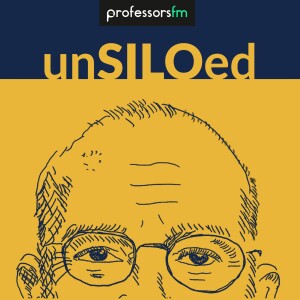
Choices and Transparency in the American Healthcare System feat. Peter Ubel
 2022-08-26
2022-08-26
In our guest's latest book “Sick to Debt,” Peter Ubel theorizes whether it is a bigger insult to call someone a doctor or an economist. Well, Peter is actually both!
Peter Ubel M.D. is a physician and behavioral scientist whose research and writing explores the mixture of rational and irrational forces that affect our health, our happiness and the way our society functions.
Ubel is the Madge and Dennis T. McLawhorn University Professor of Business, Public Policy and Medicine at the Duke University Fuqua School of Business. He uses the tools of psychology and behavioral economics to explore topics like informed consent, shared decision making and health care cost containment.
His other books include “Pricing Life: Why it’s Time for Healthcare Rationing,” and “Free Market Madness: How Economics is at Odds with Human Nature—and Why It Matters,”
Greg and Peter discuss a range of health predicaments like why smoking is still legal, the possibility of free market style health care in the US, the methods behind pricing healthcare & prescriptions, and the uncertainty of costs.
Episode Quotes:On insurance choice
If you buy life insurance, you're really just thinking about the risk of death that you'll face in a given year and if it's worth spending for what kind of premium and whatever the payment is called. If you're buying health insurance, you're thinking about a million possible services that you might need in a given year. Some are predictable, and those you should totally factor into the choice. If you know that you have multiple sclerosis and are going to be on expensive medicines, you better figure out how well the plans cover those kinds of medicines. And you’re probably gonna want to have a higher premium, low out of pocket costs. So that should inform your choice.
Society is a reflection of your individual risk.
We, as individuals, are pretty crazy about risk understanding, right? But I think the government and the society at large are a reflection of our individual risk attitudes too. And so, we end up with some crazy policies as a result.
Healthcare system in Singapore
In Singapore, they have an interesting system. The prices aren't set by some competitive market. The government says the price. So one of the reasons they spend 4% [of GNP] is the prices are much lower, and I'm not talking about prices for drugs. That's I don't know, particularly, although I'm guessing they almost, everyone in the country has lower drug prices than we have in the United States because the governments, you know, negotiate that. But even for hospital care for physician fees, things like that are much lower prices because of government regulation. What's really interesting about their model is, they have everybody mandated. And this is, again, not quite a free market. They mandate that they have some of their pay go into a health savings account.
Show Links:
Guest Profile:
- Faculty Profile at Duke Fuqua School of Business
- Professional Profile at University of Michigan
- Professional Profile on Psychology Today
- Contributor’s Profile at Forbes
- Peter Ubel Website
- Peter Ubel on LinkedIn
- Peter Ubel on Twitter
- Peter Ubel on Facebook
His Work:
- Peter Ubel on Google Scholar
- Sick to Debt: How Smarter Markets Lead to Better Care
- You're Stronger Than You Think: Tapping into the Secrets of Emotionally Resilient People
- Free Market Madness: Why Human Nature is at Odds with Economics--and Why it Matters
- Critical Decisions: How You and Your Doctor Can Make the Right Medical Choices Together
More Episodes
Create your
podcast in
minutes
- Full-featured podcast site
- Unlimited storage and bandwidth
- Comprehensive podcast stats
- Distribute to Apple Podcasts, Spotify, and more
- Make money with your podcast
It is Free
- Privacy Policy
- Cookie Policy
- Terms of Use
- Consent Preferences
- Copyright © 2015-2024 Podbean.com






